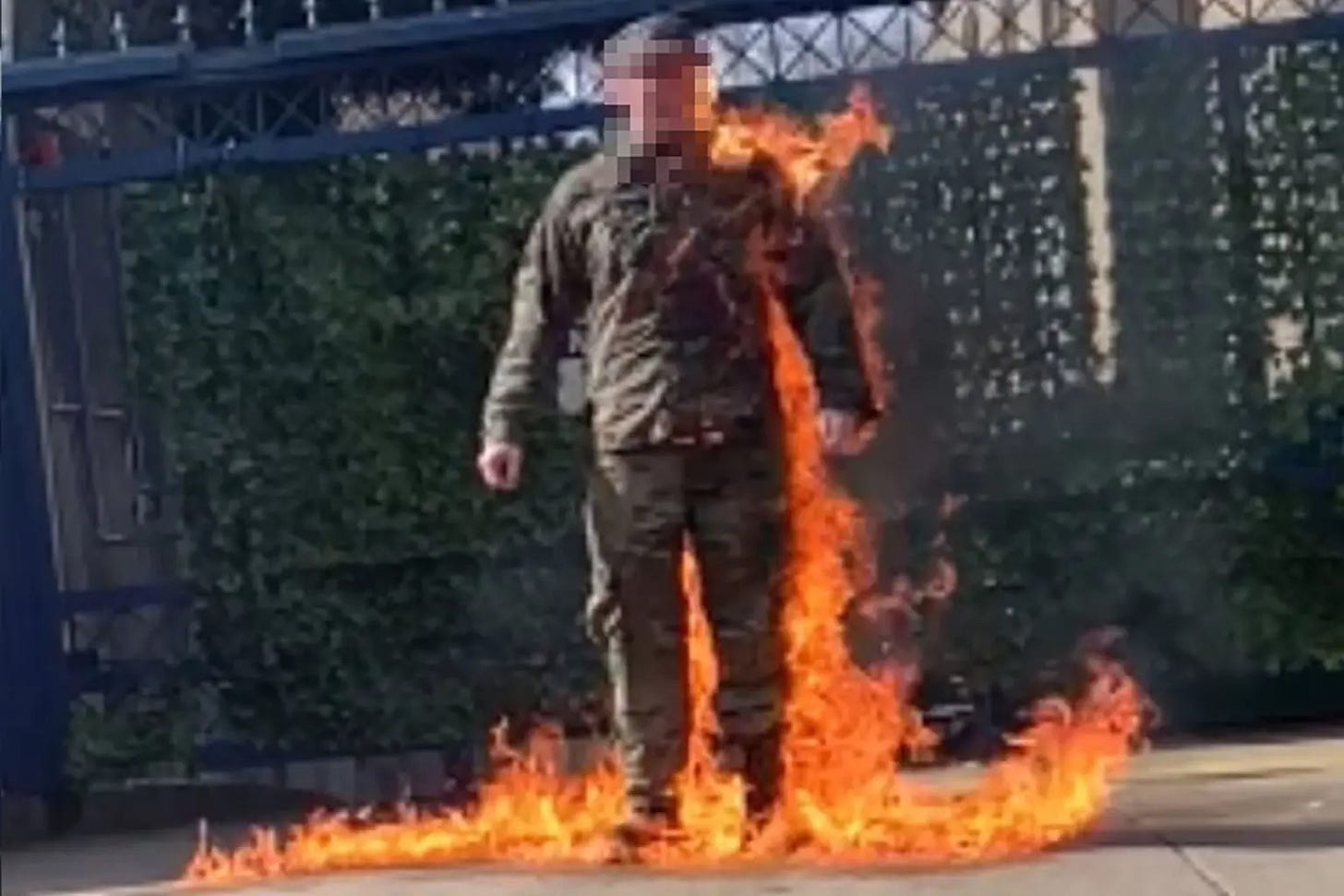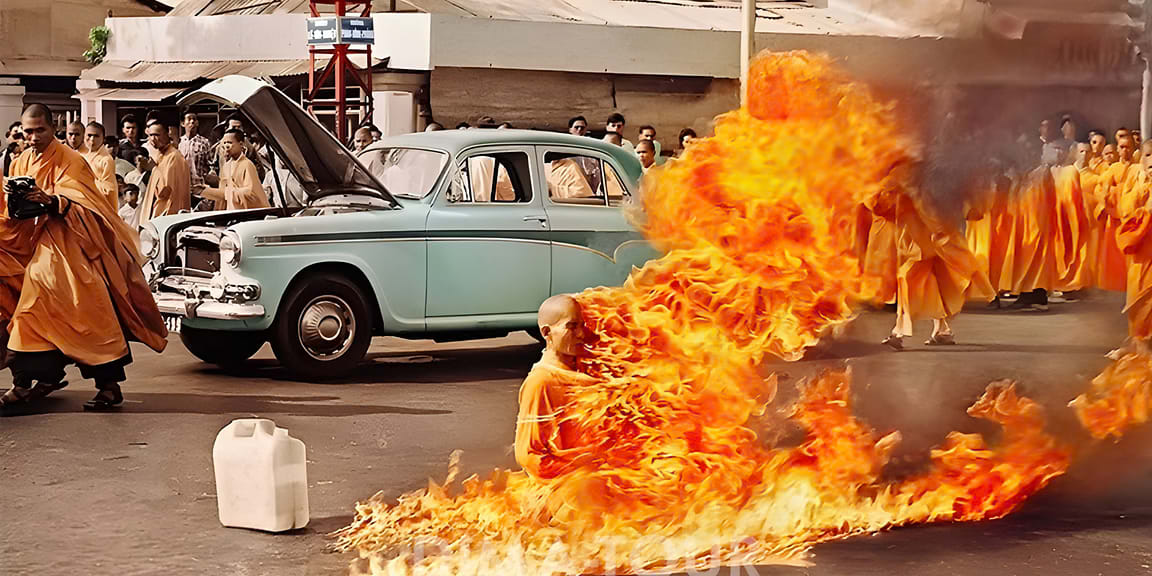I suppose it is an easy argument to make that anyone who sets themselves on fire has mental health issues. Aaron Bushnell, however, seemed beset with conflicts of political morality. When the young active-duty U.S. Air Force serviceman put himself to flame outside the Israeli Embassy in Washington, D.C., he said, and wrote, in advance that he would not be complicit in a genocide. He suggested the suffering of Palestinians under Israeli assault and American support was far more than the brief pain he was about to endure, and he would not be complicit in a genocide.
“Free Palestine, free Palestine,” he screamed as the fire brought him down.
The video, even blurred in parts, is hard to watch. Bushnell calmly narrates his act as he walks toward the embassy. In another distinctly American moment, a cop or Secret Service officer runs up and unholsters his gun and points it with two hands at the man dying on the ground. Did he expect fire from within the fire? An extinguisher was quickly used but Bushnell was declared dead after emergency transport.
The U.S. media did not know how to handle the tragedy. Anchors and pundits were clearly uncomfortable discussing the act and too often implied it was the product of a troubled mind more than politics. The goal was to get on the record with the story and then move on quickly to the broader generalities afflicting the American scene. We are a parochial nation and tend to view foreign affairs as mostly irrelevant until we see flag draped caskets arriving on our shores. Even the use of billions of our tax dollars to affect what is increasingly looking like a genocide does not seem to be of significant political or cultural consequence. Each death of a Palestinian child is seemingly justified with the mundane and hackneyed catch phrase, “Israel has a right to defend itself.”
Establishment news sources immediately set about the business of diminishing Bushnell’s act. One publication ended its report by offering up suicide hotlines for anyone troubled and considering self harm, as if Bushnell were lacking his full faculties when he decided to create the ultimate form of political protest. The religious convictions of his parents were being characterized as cultist and coverage frequently implied he was close to anarchist groups that supported Hamas, even though the Palestinian youth groups he liked on Facebook all denounced Hamas and its leadership. Bushnell was raised by two loving parents in a compound of Christians known as “The Community of Jesus,” which former members have successfully sued and publicly criticized. All indications are that he was no longer a member after he left four years ago and joined the Air Force. Colleagues who knew him in the military as a software engineer-in-training, described him as kind, soft-hearted, and caring, the diametric opposite of the angry radical as he is being portrayed in widespread reporting.
Bushnell, who was scheduled to leave the military in less than three months at the end of a four-year hitch, was stationed at Lackland Air Force Base here in Texas. The Pentagon was slow to offer a response to his dramatic act but when it finally did, the thematic overtones were predictable. It was “tragic” but the U.S. military’s “support of Israel’s right to defend itself remains ironclad.” The spokesman also told a news conference that the U.S. continues to urge Israel to make careful considerations to reduce civilian casualties, advice which has clearly gone unheeded since the five month invasion has now cost more than 30,000 lives. A potential cease fire for hostage exchanges will slow a death count in Gaza but Israel’s Netanyahu has promised to invade Rafah when the conflict resumes. About 1.5 million Palestinians are in refugee camps at that spot and cannot be relocated, which indicates bloodshed of innocents will be massive.
Given American media’s response to Bushnell’s dramatic act, expecting a political swing against Israel is a waste of intellectual energy. He is clearly being marginalized as a madman, but people frustrated with their ability to have an individual impact on horrible situations can sometimes be compelled to act irrationally, or, perhaps with more courage than can be comprehended by observers. Self-immolation is not a new form of political protest and has had some historic importance. The Arab Spring, in fact, which forced out many heads of state in the Mideast, began when a Tunisian street vendor self-immolated in 2010. A similar act occurred outside the Israeli Embassy in Atlanta last December by a woman carrying a Palestinian flag. A self-sacrificial form of complete defiance, which is, arguably, also a surrender to helplessness, first gained notoriety during the Vietnam War.
In the states, it began with an 82-year-old woman pouring lighter fluid over herself and touching it to flame to protest the War in Vietnam in 1965. A Quaker, Alice Herz, according to her daughter, did not suffer “from delusion or psychological compulsion but “had an idea about the need to do something to call attention to the gravity of the situation.” A few months later, another Quaker, pacifist Norman Morrison, drove from Baltimore to the Pentagon and burned himself alive outside the office window of the Secretary of Defense, Robert McNamara. Morrison was holding his child. Herz and Morrison appeared to be emulating another self-immolator, Thich Quang Duc, a Buddhist monk who burned himself alive in Saigon a few years earlier to protest the policies of his country’s president, which were increasingly favorable to the Catholic Church and not the Buddhist majority. Buddhists claimed discrimination and persecution under President Ngo Dinh Diem. Recurrent demonstrations and unrelenting public outrage in Vietnam followed the death of Quang Duc and Buddhist monks united with civilians to press for democratic reforms, religious freedom, and human rights.
No account was ever made of the number of Buddhists who duplicated Quang Duc’s final decision but it became a frequent occurrence as the war ramped up and oppression increased against their religion. Eight Americans chose it as a form of protest on their home country’s soil during the Vietnam Era. Although these acts are profound forms of protest to war and other injustices, there tends to always be a religious subtext. In Vietnam, Cardinal Frances Spellman of the New York City Archdiocese, saw the U.S. presence in Vietnam as a chance to expand the church, and worked closely with the Diem regime. Policies became increasingly repressive for the Buddhist majority as the war wagged on and Catholics worked to increase baptisms. The only difference between the plight of Vietnam Buddhists in the sixties and that of the Palestinians is the worship of a different god. The IDF, meanwhile, acts as America’s proxy army instead of the Pentagon sending in our troops, which emotionally disconnects the dying from Americans determined to avert their eyes.
We hardly seem to care any more, even when the blood flows in our own streets.






Bushnell had more balls than the entire military who despicably dismissed his action while hiding behind a wall of boilerplate platitudes, much less the media, who did their best to bury the story.
Thanks for covering this, Jim. The context/history of immolation was helpful, too.